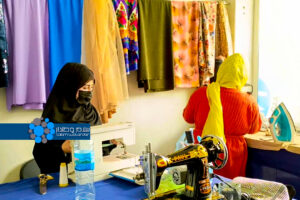KABUL (SW) – A significant number of Afghan migrants live in Pakistan where the spread of coronavirus has multiplied their difficulties.
Many Afghans are displaced because of the four decades of raging war, insecurity and poverty. Many among them chose irregular migration, which seldom results in a favorable end, and instead keep them strangled to the bundle of troubles during the journey and even in host countries.
Zulfiqar Khan, an Afghan refugee living in Peshawar, Pakistan, said since the corona virus has spread in the country, he and his fellows are facing not only health problems, but also economic problems. “I used to work as daily laborer in the markets, but when the shops are closed there is no work, and no work means no income”, he said.
Nazar Mohammad and Mujahid Khan, two more Afghan refugees living in Pakistan strived hard for years to find work for them. They said that most of the Afghan migrants who work on a daily basis, lost more than half of their income due to the coronavirus pandemic amid drop in business activities and dearth of social security for them. “The situation the migrants are faced with is very bad. They are poor and work hard, but shops and markets are often closed, which means no source of income for them”, Mujahid Khan said.
He added that this situation has left negative impact on the business. “A very large number of Afghan migrants in Pakistan rely heavily on daily wage jobs, which is why they face so many problems now during the pandemic”, he added.
The migrant said if peace came to Afghanistan, he like many of his compatriots would immediately return to their homeland. Many Afghan refugees in Pakistan said they received no financial assistance, and are even deprived of the chance to get the corona vaccine. They said the migrants who got infected with the coronavirus often resort to traditional remedies and use ginger and other herbs in hope for cure.
Malik Awal Khan, a member of the Afghan Refugee Council in Peshawar also acknowledges the unfavorable situation of migrants. He said that Pakistani authorities, in order to prevent spread of the coronavirus, placed restrictions on the businesses, which has exacerbated the problem of migrants.
He added that more than 80 percent of Afghan migrants are poor and that they are struggling to make ends meet.
According to Malik Awal Khan, the problems of the refugees have been repeatedly raised between the government of Pakistan and international aid agencies, but they have not yet been addressed. “Migrants who have been unemployed for many days every week could not pay their bills, and afford other living expenses, but there has been no solution in sight. Businesses are closed and the migrants living in the camps are facing more problems. It is the month of fasting and the problems have just multiplied. ”
Meanwhile, Sayed Abdul Basit Ansari, a media consultant at the Ministry of Refugees and Repatriations, told Salam Watandar it was not possible for hundreds of thousands of Afghan refugees around the world to be helped and assisted during current difficult times. But, he said, the issue of Afghan refugees in Pakistan has been discussed with international aid agencies and efforts are underway to find a solution to these problems.
Mir Miakhail, the head of the United Nations High Commissioner for Refugees (UNHCR) in Pakistan, has said in a statement that the Afghan government had provided cash assistance to Afghan refugees in Pakistan after the coronavirus pandemic. However, he said due to the shift in focus of this institution on other areas, the level of assistance to migrants has decreased.
“Most of the attention is currently on Syria, Libya and other countries. Afghan refugees in Pakistan are not totally dependent on the UNHCR for survival”, he said.
According to official figures, nearly 2.5 million Afghan refugees in Pakistan, Iran and other countries living in dire conditions. Due to the war and lack of employment opportunities in Afghanistan, its citizens are migrating irregularly to other countries amid escalating violence.
ENDS






